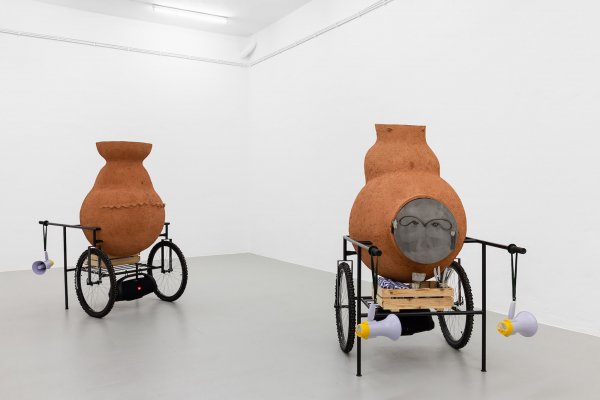Son[i]a #385 Gabriel Chaile
- 00:01 The law of hiking: the slowest person goes first
- 07:00 Dissecting chickens, playing with mud and working with your hands
- 12:18 Self-portraiture, abandoned monuments, and hours spent in the library
- 18:43 Self-portraits: finding value in oneself
- 23:00 Why are you all sleeping here? Drawing as relational space
- 29:43 A sense of survival in simple elements: the informal economy
- 33:30 Naked bodies, in transformation.
- 44:22 “I’m still naco”, ingenuousness or conflict?
- 48:40 Materialities: clay, pots, eggs, ovens…
- 57:50 Slowness as a form of resistance
- 63:04 Peeps with problems
- 65:20 Working with friends
- 77:07 Centro Cultural Ambulante (Lisbon): tacos and the class-consciousness of forms

Ever since his childhood in the Tucumán of the 1990s, Gabriel Chaile cultivated his curiosity and a creative mindset that led him to cut open chickens and explore the dirt paths along the river banks. Years later, as he devoted himself to copying and drawings the houses and sculptures in poor areas of Tucumán in order to improve his skills and his memory, Chaile realised that his attention was attuned to the street, in conversation with those who lived and came together around those forgotten monuments. This class consciousness, together with his awareness of himself and of the difficulties of discovering his own genealogy goes hand in hand with his emphasis on self-portraiture. He draws on family experiences and also the indigenous cultures of Argentina, as well as the customs and traditional economies that appear and are repeated on the outskirts of the places he visits or where he ends up living.
All of this was fertile ground for Gabriel Chaile’s practice—a series of simple metaphors, basic materialities and doing-with-others, which are essentially a pretext to convene and gather: communal meals that become a portrait of the community; eggs like the ones his father used to have at teatime; sculpture-ovens which he lights in order to cook in them, so that everything takes on meaning. Often small, always unhurried gestures that create gathering places and discussions assembled from the grassroots and the periphery.
In this podcast, we talk to Gabriel Chaile about slowness as a space of resistance, about the austere and changing bodies of his functional sculptures, and about poverty, memory and oblivion. Following the rhythm of his own life, we travel from the shores of Tucumán to the centre of the contemporary art world and the international scene. And along the way, we discover and lay the first stones of his Centro Cultural Ambulante [Travelling Cultural Centre], which is not really a space but a beacon calling for an attitude to life and connection with others.
This podcast is part of New Perspectives for Action. A project by Re-Imagine Europe, co-funded by the European Union. Co-produced by Sonic Acts and Paradiso.
Conversation: Javiera Cadiz, Txe Roimeser and Anna Ramos. Script and sound production: André Chêdas. Voice over: Violeta Ospina. Sounds: RWM Working Group, sounds from the Willem Twee Studios library, in Den Bosch.
